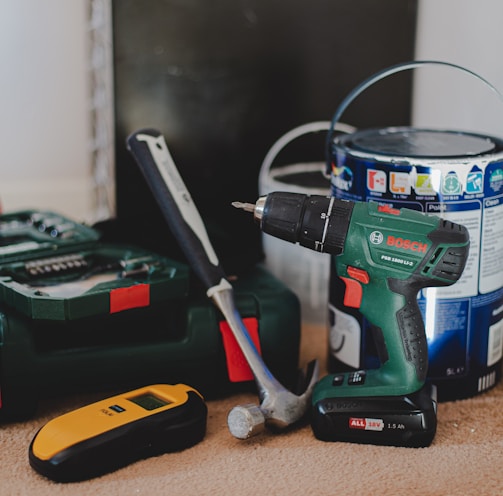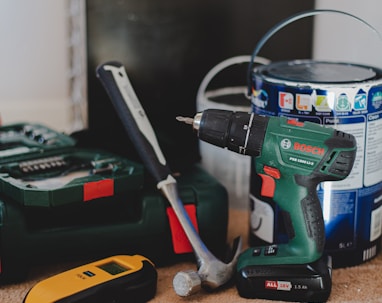Tools Of The Trade
Essential Tools for DIY Projects:
Measuring Tools:
Tape measure, combination square, and a level.
Cutting Tools:
Handsaw, circular saw, jigsaw, and utility knife.
Fastening Tools:
Hammer, screwdrivers (flathead and Phillips), power drill, and assorted nails and screws.
Joinery Tools:
Wood glue, clamps, and a doweling jig or biscuit joiner.
Finishing Tools:
Sandpaper, paintbrushes, rollers, and a paint sprayer (optional).
Safety Gear:
Safety glasses, dust mask, ear protection, and work gloves.
Electrical Tools (if applicable):
Wire stripper, wire cutter, voltage tester, and pliers.
Plumbing Tools (if applicable):
Pipe wrench, adjustable wrench, plunger, and Teflon tape.
Ladder or Stepladder:
Choose a sturdy ladder appropriate for the height of your tasks.
Toolbox or Tool Storage:
Keep your tools organized and easily accessible.
Essential Equipment for Various Renovation Tasks:
Painting and Finishing:
Paint sprayer, paint rollers, paintbrushes, drop cloths, and paint trays.
Flooring Installation:
Flooring nailer, knee pads, and a tile cutter or wet saw (for tiling).
Plumbing Projects:
Pipe wrenches, pliers, pipe cutter, and a plumber's snake.
Electrical Projects:
Wire stripper, voltage tester, wire nuts, electrical tape, and a multimeter.
Carpentry and Woodworking:
Router, chisels, coping saw, and a wood lathe (for advanced projects).
Drywall and Framing:
Drywall saw, stud finder, drywall joint compound, and framing square.
Finding Quality Tools at Budget-Friendly Prices:
Online Marketplaces:
Websites like Amazon, eBay, and specialized tool retailers often offer competitive prices.
Local Hardware Stores:
Check for sales, discounts, and clearance items in your local hardware store.
Tool Rental Shops:
Consider renting expensive or specialized tools for one-time or occasional use.
Discount Stores and Warehouses:
Stores like Home Depot, Lowe's, or warehouse clubs often offer quality tools at competitive prices.
Secondhand and Thrift Stores:
Look for gently used tools that are still in good condition.
Safety Precautions for DIY Projects:
Use Safety Gear:
Always wear appropriate safety glasses, ear protection, dust masks, and gloves when working with tools.
Read and Follow Instructions:
Familiarize yourself with the manufacturer's instructions for each tool and follow safety guidelines.
Work in a Well-Ventilated Area:
Ensure proper ventilation when working with paints, solvents, or any potentially harmful substances.
Store Tools Safely:
Keep tools in a designated storage area to prevent accidents and ensure they're in good condition for future use.
Stay Focused and Avoid Distractions:
Concentrate on the task at hand to prevent accidents caused by loss of focus.
Know Your Limits:
If a project requires skills or tools beyond your expertise, seek professional help.
Keep Emergency Contacts Handy:
Have access to emergency numbers and first aid supplies in case of accidents.
Remember, safety should always be a top priority when working on DIY projects. Following these precautions will help ensure your DIY journey is as hazard-free as possible.


